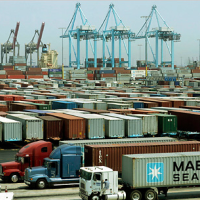U.S. Supreme Court Seems Poised to Whack L.A. Clean-Air Effort at Port
 Port of Los Angeles (photo: Ric Francis, Associated Press)
Port of Los Angeles (photo: Ric Francis, Associated Press)
State and local efforts to clean up the air around the busy Port of Los Angeles received a harsh reception from the U.S. Supreme Court last week in a hearing to determine if federal law preempts two anti-pollution programs.
The port undertook the Clean Air Action Plan in 2006 and the Clean Truck Program (pdf) in 2008 in response to criticism from environmentalists and community activists who opposed expansion of the port unless something was done about the miserable air generated by trucks coming, going and, most insidiously, idling on nearby streets.
The truck program required motor carriers to modernize their fleets with less-polluting vehicles, comply with operational and safety standards, display a placard and stop idling nearby. Those that don’t abide by the rules can be banned from the port.
Truckers sued and last Tuesday the justices heard oral arguments in American Trucking Associations, Inc. v. City of Los Angeles over whether the port should be able to dictate their behavior in light of federal law that prohibits interference with interstate commerce.
The port authority, an independent division of the city, argues that it should be regarded as a business and deserves to be treated as such when prohibitions by the Federal Aviation Administration Authorization Act (FAAAA) are considered. Stephen Rosenthal argued on behalf of the port that it “should be entitled under even-handedness to do what a Wal-Mart or any other company could do to enable us to prosper, grow, and nurture our business enterprise.”
Although Justice Stephen Breyer wondered if a ruling adverse to the port would restrict even its basic ability to establish routing requirements and Justice Ruth Bader Ginsburg wondered how the port could “go green” without the programs, Justice Antonin Scalia told Rosenthal he had “a very high hill . . . to climb.”
The court is considering two relatively technical questions: whether mandatory concession agreements demanded by the port are saved from federal preemption by its claim to a “market participant” exemption, and whether Castle v. Hayes Freight Lines, Inc. prohibits the port from curtailing port access to noncompliant carriers.
A ruling by the court in favor of the truckers could put a serious crimp in plans for expansion at the container port, which is the largest in the nation. The Port of Los Angeles employs 16,000 people and generates 919,000 regional jobs along with $39.1 billion in wages and tax revenues annually.
And, depending on how broadly the court rules, its decision could deal a blow to all local and state efforts to restrain private enterprise involved in interstate commerce that negatively affects the environment and public safety.
–Ken Broder
To Learn More:
Argument Recap: Keep on Truckin’? (by Miriam Seifter, ScotusBlog)
The Environmental Dimension of American Trucking (by Miriam Seifter, Legal Planet)
The Port of Los Angeles' Clean Truck Case to Be Heard by the U.S. Supreme Court on Tuesday (by Melissa Lin Perrella, Natural Resources Defense Council Staff blog)
Will the Supreme Court Gut the Port of Los Angeles Clean Trucks Program? (by Kerry Cavanaugh, KCRW)
Supreme Court Seems Open to Nixing L.A. “Clean Truck” Program (by Jeremy P. Jacobs, Greenwire)
American Trucking Associations, Inc v. City of Los Angeles, et al (U.S. Supreme Court)
- Top Stories
- Controversies
- Where is the Money Going?
- California and the Nation
- Appointments and Resignations
- Unusual News
- Latest News
- California Forbids U.S. Immigration Agents from Pretending to be Police
- California Lawmakers Urged to Strip “Self-Dealing” Tax Board of Its Duties
- Big Oil’s Grip on California
- Santa Cruz Police See Homeland Security Betrayal in Use of Gang Roundup as Cover for Immigration Raid
- Oil Companies Face Deadline to Stop Polluting California Groundwater





